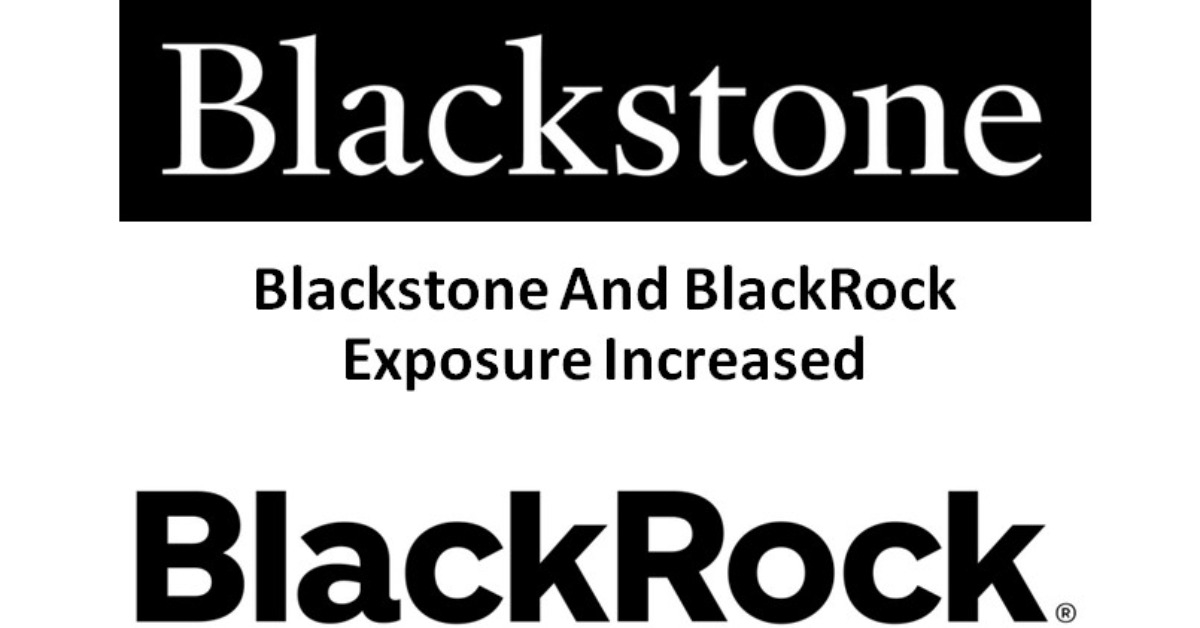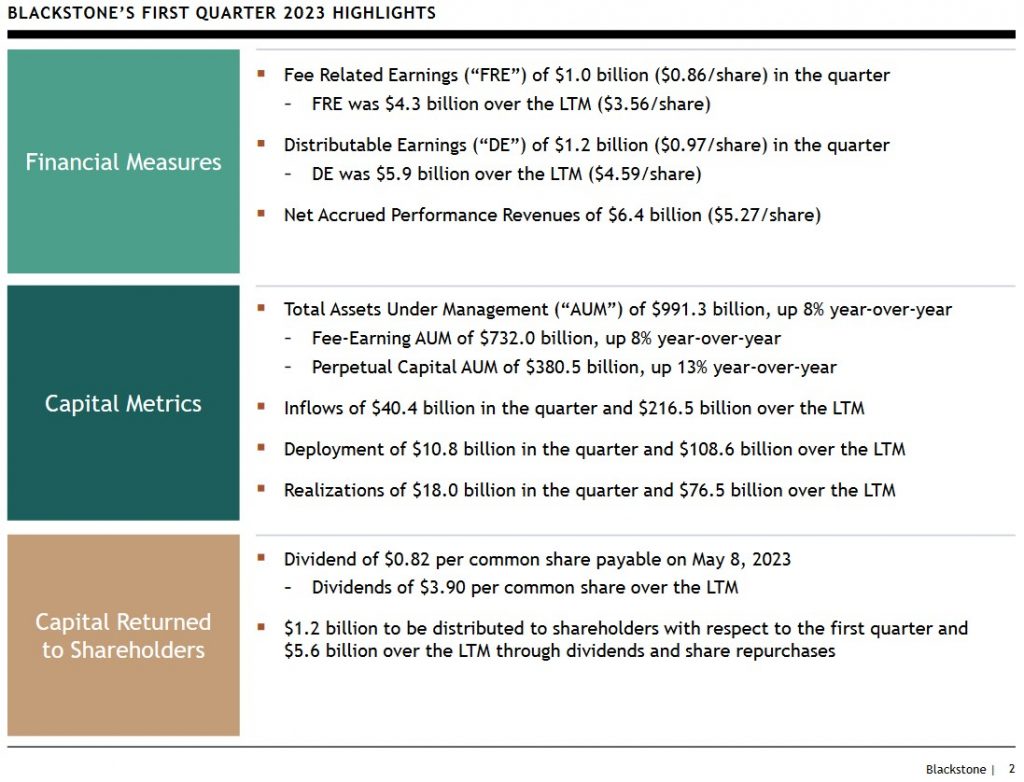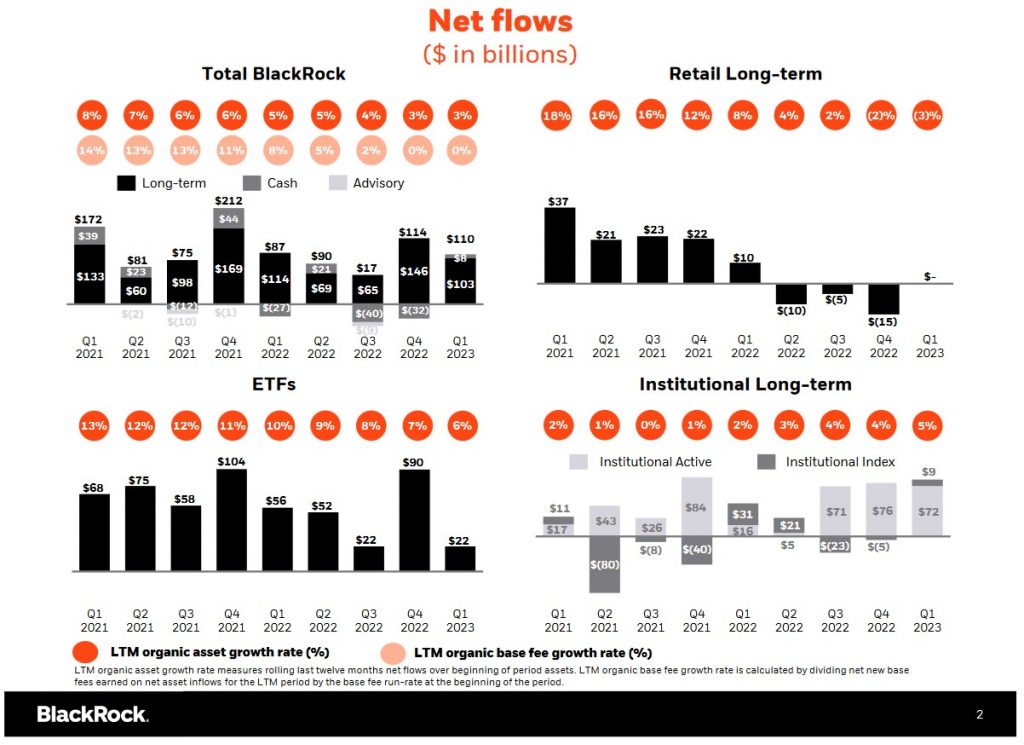
In previous posts, I have explained my rationale for investing in BlackRock (BLK) and Blackstone (BX) for the long term. I, therefore, dispense with a review of these two companies and merely provide this brief post to disclose the following additional purchases on May 9:
- BLK – acquired 30 shares @ $635.349 bringing my total exposure to 130 shares
- BX – acquired 100 shares @ $81.649/share bringing my total exposure to 1,462 shares
All shares are held in a ‘Core’ account within the FFJ Portfolio.
While both are within the Asset Management industry, they are different in some respects.
BLK focuses more heavily on traditional asset classes like equity, fixed-income, balanced and money market funds.
BX focuses on less-liquid alternative investment vehicles with an emphasis on private equity, real estate, public debt and equity, infrastructure, life sciences, growth equity, opportunistic, non–investment grade credit, real assets and secondary funds, all on a global basis.
Both benefit from switching costs and intangible assets that include organizational attributes such as product mix, distribution channel concentration, and geographic reach. Furthermore, they both have strong and respected brands and their reputations have been built over the years through successful, maintainable track records of investment performance.
BLK has ~$9.1T in assets under management (AUM) and BX has ~$991B.
Given the sheer magnitude of their total AUM, it should be expected that not every investment will go according to plan. In typical fashion, the media often focuses on ‘negative’ events.
BX, for example, has recently defaulted on hundreds of millions of its commercial mortgage-backed securities (CMBS), sending over $1B in mortgage debt into ‘special servicing’.
Special servicing arises when a borrower defaults on CMBS payments. A special servicer is assigned to restructure the loan which can result in a payment plan, an interest penalty, or outright foreclosure.
Here are recent examples.
In mid-February, BX defaulted on a $0.27B CMBS for several towers in its Manhattan multi-family portfolio. These towers are comprised of ~637 apartments of which ~96% of the units are rented at market rate.
It also defaulted on a ~$0.562B Nordic CMBS. This loan originated in December 2017, to partially finance BX’s privatization of Sponda Oy, a Finnish real estate owner. The portfolio financed by this CMBS consisted primarily of secondary offices and retail assets located predominantly in regional locations around Helsinki. BX had intended to sell the underlying properties but disruptions caused by the COVID-19 pandemic prevented prospective buyers from visiting the assets thereby delaying the business plan. Russia’s invasion of Ukraine in February 2022 likely further prevented sales as buyers were hesitant to invest in a country that shares a border with Russia.
In January, BX requested a 1-year extension to the February 15, 2023 loan maturity. Following extensive negotiations throughout ~2 weeks, the servicer announced in early March that the loan had defaulted and had been placed into special servicing.
BX’s highly popular and massive $71B Blackstone Real Estate Income Trust (BREIT) has also experienced a liquidity issue in recent months; BX has limited redemptions every month since late 2022.
However, investors need to realize that in BX’s funds, the time horizon of the investments is closely aligned with the duration of the capital. This positions BX so as not to be a forced seller in difficult markets.
BREIT, is a semi–liquid vehicle which invests in longer–term assets. This investment vehicle has been designed from the outset (2017) with predetermined limits for potential repurchases. This was done to be prepared for adverse market conditions thus creating a level of safety so that it can continue to deliver strong outperformance over the long term.
Currently, investor sentiment toward real estate has been negative. This is largely due to pressures in the US office market where vacancies in offices have reached all–time high levels; owners of many of these assets may be unable to extend financing in a more constrained capital environment. BX, however, has minimal exposure to traditional US offices, having reduced such holdings from over 60% of the real estate equity portfolio at the time of BX’s 2007 IPO to less than 2% today. Instead, BX emphasizes sectors that are doing very well, such as logistics, where this form of real estate comprises 40% of the portfolio versus ~0% in 2007.
Strong Long-Term Inflows
BX and BLK continue to report strong long-term inflows.
In Q1, BX generated inflows of $40.4B. It has also generated $216.5B over the last 12 months.
The following are just a few examples of some of the inflows BX has reported.
- BX is seeing the greatest demand for private credit solutions, given higher interest rates and wider spreads. The pullback in regional bank activity is also benefitting BX’s credit, real estate credit and insurance solutions teams which accounted for ~60% of Q1 inflows.
- 4 major insurance clients allocated an additional $8B to BX in Q1. In October 2022, Resolution Life and BX announced a strategic partnership to support the continued growth of Resolution Life, a leading global life and annuity insurance consolidation business. In Q1, the $3B external fund–raise was fully committed and the repositioning of Resolution Life’s asset base commenced.
- BX also launched a new U.S. direct lending product for both institutional and insurance clients with a $10B target for this first vintage.
- It has also raised ~$6B for its green energy–oriented private credit vehicle and management expects to reach the $7B cap in June.
- BX’s new real estate debt vehicle has received $3.5B of commitments.
In Q1, BLK generated:
- $103B of quarterly long-term net inflows, representing 5% annualized organic asset growth, driven by continued momentum in bond ETFs and significant outsourcing mandates; and
$110B of quarterly total net inflows reflecting net inflows to BLK’s diversified cash management platform.
Final Thoughts
In a nutshell, BX and BLK continue to raise substantial inflows despite challenging market conditions. This is a testament to their people, reputation, knowledge and historical performance.
Every industry goes through a period of growth and consolidation. Given the current environment, many small asset managers will likely wither and die because they will simply be unable to compete against BX and BLK on the most meaningful investment opportunities.
Warren Buffett always recommends investors be ‘fearful when others are greedy, and greedy when others are fearful.’
Looking at BX’s and BLK’s share price performance, it appears many investors are fearful. I, however, think both companies have a very strong probability of generating attractive long-term total investment returns. This is why I recently increased my BX and BLK exposure.
I wish you much success on your journey to financial freedom!
Note: Please send any feedback, corrections, or questions to finfreejourney@gmail.com.
Disclosure: I am long BX and BLK.
Disclaimer: I do not know your circumstances and do not provide individualized advice or recommendations. I encourage you to make investment decisions by conducting your research and due diligence. Consult your financial advisor about your specific situation.
I wrote this article myself and it expresses my own opinions. I do not receive compensation for it and have no business relationship with any company mentioned in this article.



